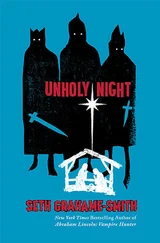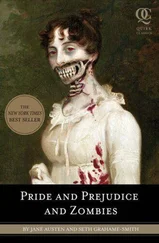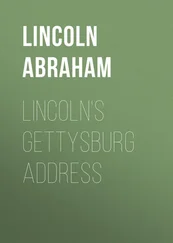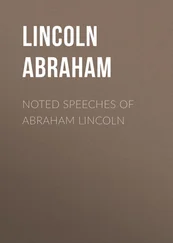FIG. 23A. - YOUNG ABE IN HIS JOURNAL BY FIRELIGHT, ACCOMPANIED BY SOME OF HIS EARLY VAMPIRE-HUNTING TOOLS.
Soon, Abe could split more logs in a minute than his father.
Two years had passed since those first months in the lean-to. The family now lived in a small, sturdy cabin with a stone fireplace, shingled roof, and raised wooden floor that stayed warm and dry in winter. As always, Thomas worked just enough to keep them clothed and fed. Nancy’s great-aunt and great-uncle Tom and Elizabeth Sparrow had come from Kentucky to live in one of the outbuildings and help out around the farm. Things were good. “I have since learned to distrust such stillness,” Abe wrote in 1852, “as it is always, always prelude to some great calamity.”
One September night in 1818, Abe awoke with a start. He sat straight up in his bed and shielded his face with his hands, as if someone had been standing over him, threatening to bring a club down on his head. No one did. Realizing the danger was imagined, he lowered his hands, caught his breath, and looked around. Everyone was asleep. Judging by the embers in the fireplace, it was two or three in the morning.
Abe ventured outside wearing nothing but his sleeping gown, despite the early arrival of autumn. He walked toward the silhouette of the outhouse, still half asleep, closed the door behind him, and sat. As his eyes adjusted, the moonlight coming in though the planks suddenly seemed bright enough to read by. With no book to pass the time, Abe ran his hands through the tiny shafts of light, examining the patterns they made on his fingers.
Someone was talking outside.
Abe held his breath as the footfalls of two men grew closer, then stopped. They’re in front of the cabin . One spoke in an angry whisper. Though he couldn’t make out the words, Abe knew the voice didn’t belong to anyone in Little Pigeon Creek. “The accent was English, and the pitch uncommonly high.” The stranger ranted for a moment, then paused, waiting for an answer. It came. This time, the voice was very familiar. It belonged to Thomas Lincoln.
I pressed my eye to one of the spaces between the planks. It was indeed Father, and he was with someone I had never seen before. This stranger was a squat figure of a man, clad in finer attire than I had ever seen. He was missing his right arm below the elbow—the sleeve neatly pinned to his shoulder. Father, though easily the larger of the two, seemed to cower before this companion.
Abe struggled to make out their conversation, but they were too far away. He watched, trying his best to read their gestures, their lips, until…
Father, suddenly mindful of waking us, urged his companion away from the cabin. I held my breath as they drew closer, certain that I would be revealed by the hammering of my heart. They stopped not four yards from where I sat. It was in this manner that I overheard the last of the argument. “I cannot,” said Father. The stranger stood in silence and disappointment.
Finally he gave his reply. “Then I’ll take it in other ways.”
IV
Tom and Elizabeth Sparrow were dying. For three days and nights, Nancy nursed her great-aunt and great-uncle through scorching fevers, delusions, and cramps so severe they made the six-foot Tom weep like a child. Abe and Sarah stuck close to their mother, helping her keep the compresses wet and the bedding clean, and praying with her for a miraculous recovery that they all knew, deep down, wouldn’t come. The old folks had seen this before. They called it “the milk sick,” a slow poisoning brought on by drinking tainted milk. It was untreatable and fatal. Abe had never watched someone die before, and he hoped that God would forgive him for being slightly curious to see it happen.
He hadn’t dared confront his father about what he’d seen and heard a week earlier. Thomas had been especially distant (and largely absent) since that night, and seemed to want no part of the vigil taking place at Tom and Elizabeth’s bedside.
They died in quick succession—he first, she a few hours later. Abe was secretly disappointed. He’d half expected a last desperate gasp for breath, or a touching soliloquy, as in the books he was now reading to himself at night. Instead, Tom and Elizabeth simply fell into a coma, lay still for several hours, and died. Thomas Lincoln, without so much as a word of condolence to his wife, set about fashioning a pair of coffins from planks and wooden pegs the next morning. The Sparrows were in the ground by supper.
Father had never been particularly fond of Aunt and Uncle, and they were hardly the first relations he had buried. Yet I had never known him to be so quiet. He seemed lost in thought. Uneasy.
Four days later, Nancy Lincoln began to feel ill. At first, she insisted it was nothing more than a headache, no doubt brought on by the stress of Tom and Elizabeth’s death. Nevertheless, Thomas sent for the nearest doctor, who lived thirty miles away. By the time he arrived, just before sunrise the next morning, Nancy was delusional with fever.
My sister and I knelt at her side, trembling from fear and want of sleep. Father sat on a nearby chair as the doctor examined her. I knew that she was dying. I knew that God was punishing me. Punishing me for my curiosity over Aunt and Uncle’s death. Punishing me for killing a creature that had shown me no malice. I alone was responsible. When the doctor was finished, he asked for a word with Father outside. When they returned, Father could not help his tears. None of us could.
That night, Abe sat alone by his mother’s side. Sarah had fallen asleep next to the fire, and Thomas had nodded off in his chair for the moment. Nancy had finally fallen into a coma. She’d been screaming for hours—first from the delusions, and then from the pain. At one point, Thomas and the doctor had restrained her while she shrieked about “looking the devil in the eyes.”
Abe took the compress off her forehead and dipped it in the water bowl by his feet. He’d have to light another candle soon. The one by her bedside was beginning to flicker. As he lifted the compress and wrung it out, a hand seized his wrist.
“My baby boy,” whispered Nancy.
The transformation was total. Her face was calm, her voice gentle and even. There was something of a light in her eyes again. My heart leapt. This could only be the miracle I had so earnestly prayed for. She looked at me and smiled. “My baby boy,” she whispered again. “Live.” Tears began to run down my cheeks. I wondered if this was just some cruel dream. “Mama?” I asked. “Live,” she repeated. I wept. God had forgiven me. God had given her back to me. She smiled again. I felt her hand slip from my wrist, and I watched her eyes close. “Mama?” Once more, this time barely above a whisper, she repeated, “Live.” She never opened her eyes again.
Nancy Hanks Lincoln died on October 5th, 1818, age thirty-four. Thomas buried her on a hillside behind the cabin.
Abe was alone in the world.
His mother had been his soul mate. She had shown him love and encouragement since the day he was born. She had read to him all those nights, always holding the book in her left hand and gently twirling a finger through his dark hair with the right as he fell asleep on her lap. Hers had been the first face to greet him when he entered the world. He hadn’t cried. He had simply looked at her and smiled. She was love, and light. And she was gone. Abe wept for her.
No sooner was she buried than Abe resolved to run away. The thought of staying in Little Pigeon Creek with his eleven-year-old sister and grief-stricken father was more than he could bear. Before his mother was thirty-six hours dead, Abe Lincoln, nine years old, trudged through the Indiana wilderness, carrying all of his meager possessions in a wool blanket. His plan was brilliantly simple. He would walk as far as the Ohio River. There, he would beg his way onto a flatboat and float down to the lower Mississippi, then into New Orleans, where he’d be able to stow away on any number of ships. Perhaps he’d find his way to New York or Boston. Perhaps he’d sail to Europe, to see the immortal cathedrals and castles he’d often imagined.
Читать дальше












